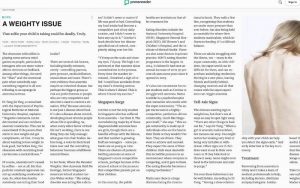It’s happening all over the world. People are losing their livelihoods. The pandemic has brought the world’s economy to its knees and millions are now out of work; businesses are folding; and many are losing their jobs in Singapore, too. We’ve all read the statistics and they’re just plain bad – downright awful, even. If the virus doesn’t get your body, it just might get your wallet.
But when job loss happens to your own family, the statistics become a reality. And, frankly, it knocks the wind right out of you. I know because we learned this week that my husband’s company is shuttering its Singapore office. The timing is awful. The job he’s held for two decades as a commodities broker is now gone — just four weeks after his father died. We have now been living here in Singapore for more than seven of those years and now — overnight — our whole life is turned upside down. We have no idea what the next month will hold. I hate this damn virus.
Job losses are stacking up across the globe. So, what do you need to know if you lose your job in Singapore?
Employment Pass basics
For many expats living here, that all-important Employment Pass (EP) is key to staying in Singapore. The EP must be cancelled within one week of the employee’s last day of work with the company. The cancellation takes immediate effect. Once the EP has been cancelled, the former EP holder will be issued an acknowledgement letter and a Short Term Visit Pass (STVP) that’s good for thirty days. Yup. Thirty days. You have just thirty days to get your life in order.
Are there exceptions, especially now? Spencer Chew, a Senior Legal Associate with Consilium Law Corporation, helps distill the current situation.
“An STVP holder can seek an extension through ICA. There have been a number of STVPs extended due to the COVID-19 situation. The employer can request an extension for its former employee because of the pandemic situation using this form. This form is applicable if:
- the employee’s pass has already been cancelled, but the employer is unable to send the pass holder home due to the present travel restrictions in place; or
- a flight has been booked to send the pass holder home by 31 July 2020.”
All the passes tied to the EP such as the Dependant’s Pass (DP) and Long Term Visit Pass (LTVP) will also be automatically cancelled at the same time as the EP. If the DP holder happens to hold a job with a Letter of Consent (LOC), the LOC will also be automatically cancelled.
That’s what I have to work at Expat Living, an LOC. That means I also will lose my job. Both of us will be out of work and the whole family has to go. But go where? We have no idea. Heading back to the US with 36 million people unemployed and a raging pandemic doesn’t seem optimal, but unless we find other jobs, that’s likely where we’ll end up.
Other passes
If you want to stay in Singapore, there are a few things you can do while you look for a job that comes with an EP.
High-earning EP holders can apply for something called a Personalised Employment Pass (PEP), a one-time extension that is good for three years. To qualify, current EP holders must make at least $12,000 a month and overseas foreign professionals need to pull in $18,000 a month or more on their last drawn paycheck. You should apply for this pass before the EP is cancelled so get right on it. If you get a PEP, your family can generally get the same passes they held before. This means everybody can keep going to school and working while the EP holder looks for another bread-winning job. PEP holders cannot be business owners or engage in entrepreneurial activities. Unfortunately, the government has been issuing very few PEPs in the current environment.
Another possibility is applying for Student Passes for your children if they are enrolled in a recognised program within Singapore. Most international schools will help you with the application as it’s in their vested interested to keep your kids at school, but not all schools can do this so you’ll need to check. Then, only the mother or grandmother of the child can apply for a Long Term Visit Pass (LTVP), allowing the mother and child to stay in Singapore even after the EP holder loses a job.
Spencer has advice on these passes, too. “Some schools also require both parents’ authorisation to apply for their children to be placed on a Student’s Pass. This sometimes becomes an issue when parents are going through a divorce, and the EP holder refuses to provide authorisation. In such circumstances, the parent without an EP may have to apply to the Family Justice Courts (FJC) to seek the necessary orders against the parent who is refusing.”
Setting up your own business
You can even try setting up your own business by incorporating through ACRA. Be sure to plan well and use a company to walk you through the incorporation process and know that there may be more red tape and hurdles to cross than in your home country. If you’re not a Singapore PR or citizen, you’ll have to have a local person act as your director; most of the companies who set up companies can provide the director for you for a fee. They will also charge a fee every time there needs to be an official signature, which could be expensive if your company requires a lot of contracts to be signed. Take a look at this Expat Living article, which has more about what you need to know to set up your own company.
You can set up your business with a pipe dream, but then applying for an EP under your business is far more involved. First off, be prepared for a lot of paperwork. MOM will probably want details on the company’s activities and proof of ongoing business operations such as bank statements, sales invoices issued to major clients, financial statements, major client contracts secured, and latest corporate bank statements. They’ll likely want details on the company’s products, licenses and photos of their operations. The main concern is the financial health of the company.
How are things different during COVID-19?
I think most of us know that, in light of COVID-19, the Singapore Government has restricted entry of foreigners into Singapore in order to reduce the number of imported cases. That means that employers are encouraged to defer all new applications and appeals for EPs until after the end of the circuit breaker period (1 June 2020 – unless extended further). It is unlikely that MOM will approve any new pass applications during this period unless the applicant is already in Singapore.
After the circuit breaker period, companies can resume applications for new work passes. However, the ban on the entry of Short Term Visitors into Singapore may well continue to be in place. For applicants who are not currently in Singapore, employers will have to get approval from MOM for employees to enter Singapore and only a limited number of these will likely be granted until the situation stabilises. Even if entry approval is granted, the employee must serve a fourteen-day Stay Home Notice period at a designated facility upon arrival or in their own residence as long as nobody else lives in that residence.
All to say, getting another job approved in Singapore during this pandemic is likely to be far harder than usual. But perhaps in some ways, if you’re already living here and the employer really needs somebody, this could work to your advantage as nobody else can come in from outside the country. The field is narrowed in your favour in some ways.
Negotiating severance
Severance packages must be negotiated, but there are some things employees are obliged to pay to a foreign employee, such as the following:
- unpaid salary
- unused accrued annual leave entitlement
- salary in lieu of notice
- maternity benefits (where applicable)
- other benefits under employment contract
But there are some other, non-obligatory things that you might try to have added to your severance package.
- ex-gratia payments
- cash allowances
- continuation of insurance plan
- out-placement services
- legal fees
Searching for new job
Looking for a new job during a pandemic may seem impossible. Isn’t the whole globe out of work? How can you interview just now? Don’t worry – there are jobs out there. But where do you start?
Well, first of all, take a deep breath then tell every single person you know that you’re looking for a job. Let your network of friends and colleagues help you. Don’t get hung up being embarrassed. Your friends understand that the economy is awful and COVID-19 job loss is part of our current situation. Remember that most people get jobs through networking. There are still people hiring. In fact, there’s even a special page on LinkedIn where companies are listing jobs. And, of course, there are the traditional head hunters.
There are lots of job search sites, too, such as Job Street and Monster. And now Google even lists jobs. You can type in, “Journalism, job, Singapore” and Google will list the vacancies.
Dealing with landlords
Most expats probably have a diplomatic clause in their contract. They’re all a bit different, but generally, if you’ve lived in your home for twelve months, you can give two months notice and get out of your lease if you’re being transferred out of Singapore by your employers, or if you cease to be employed. But it’s important to read your lease well as not all are the same. Some also require you to pay a portion of the rental agent fee if you ditch out of your contract too soon. Some landlords are even more difficult, nitpicking every little thing as they’re frustrated at losing months of expected rent. Work hard to get your home in good order before moving out. Perhaps even work with your landlord to find somebody to take over your lease.
Spencer helps decode what to expect in these COVID-19 times. “Generally, unless the tenancy agreement specifically stipulates, the landlord isn’t under any duty to offer concessions to the tenant, and the tenant remains bound to his obligations under the agreement.”
So if you don’t have a diplomatic clause, you may be stuck. Pay particular attention and look out for things in your lease such as a diplomatic clauses, a right to terminate clause, or any force majeure clauses.
What’s a force majeure? It’s a provision that addresses unexpected external circumstances that may prevent a party from discharging its duties. Does COVID-19 count? Well, the two parties have to agree on the scope and definition of these external circumstances, and force majeure clauses are usually drafted narrowly. It will depend on each and every situation.
Spencer explains that it’s usually for the tenant to prove that:
- the event in the clause has occurred and results in the tenant being unable to or delayed in performing his contractual obligations;
- the non-performance is due to the unforeseen and unexpected circumstance;
- the circumstance is beyond the tenant’s control;
- there are no reasonable steps that the tenant can/could have taken to avoid or mitigate the event or its effects.
Moving home when you lose your job
If you don’t get a new job and none of the other passes come through, the law in Singapore is that the company that held your EP must pay to repatriate a retrenched employee. Spencer explains, “A company is responsible for costs associated with repatriating the foreign employee unless the EP consents otherwise in writing, like in the employee’s contract. The requirement is statutory and, as such, as long as the foreign employee holds a valid EP, this is a legal obligation on the part of the employer.” So even if you are working without a contract, but your company sponsored your EP, the company must pay all costs of repatriating you and your dependants.
The cost of transporting furniture and belongings can be sought through negotiation of an exit agreement. You can also negotiate the cost of repatriating pets. Most multinational companies will cover this cost, but smaller companies may not.
Be sure to also check on your medical insurance. Will it cover you when you move? Many companies offer health care extensions, but if you aren’t so lucky, you’ll need to figure out your options back home. Be vigilant about this. You do not want a period of no coverage, now moreso than ever. Be sure to get medical records to take with you, and check in with the orthodontist on your kid’s plan so that you can get the same care where you move.
I also spoke to our vet and it turns out that moving your pet home is harder now, too. The prices have increased dramatically in some cases and some countries are requiring quarantine prior to flying when they used to not. The quarantine only adds to the price tag. She recommended using Jason’s Pet Relocation.
Culling your things
You’ll likely want to dump stuff before you leave. Wattage on appliances is often different where you’re headed and you cannot bring some things into another country such as alcohol. But even getting rid of things has changed during COVID-19.
You can still get pass things on to others via Facebook pages such as Real Singapore Expat Wives Classifieds and Classifieds – Singapore Expat Wives. Or you can try selling them on Carousell. Lots of people also sell stuff on their school’s Facebook page. But be forewarned: people aren’t buying like they normally do in May when everybody is repatriating. Everybody is a bit scared of germs. Selling things may be tough.
If you want to donate items, many of the usuals such as New2U Thrift Shop, MINDS Shop and Metta Welfare Association are currently closed. However, you can still list donations on Pass It On, Blessings Only and The Salvation Army donation-in-kind booths are still open. And, of course, you can send items home to your helper’s family for $150 a box to the Philippines.
Managing emotions
Of course, a big part of leaving when you lose your job is the emotions that go with it. There’s shock, denial, anger, grief, embarrassment – it’s all there. You need to give yourself space to embrace all these things: the feelings are important to acknowledge. Yet you can’t let yourself be paralysed by it all. You have too much to organise in those thirty days.
Still, juggling these emotions is downright hard. Maria Luedeke from Aspire Counselling offers some advice.
“Who we are is largely socially determined by what we do, so the loss of a job is the loss of a part of our identity. It can trigger all sorts of anxieties. It’s important to focus on the fact that while you didn’t choose to leave your job, you do have a choice as to how you react to losing your job. Coping with job loss positively revolves are three basic areas: first, planning for changed financial circumstances; second, cognitive restructuring of thoughts and ideas around job loss; and third, taking definite action including setting goals and structured work aimed at taking charge of the situation and moving towards a positive outcome.”
If you’re having a really tough time, find a qualified counsellor or coach to help you move more positively forward.
Letting your helper go
For me, one of the hardest thoughts about leaving Singapore and losing our jobs would be saying goodbye to our amazing helper, Cristina. She started working for us the month we got here when my children were just toddlers. She is a huge part of our family. I want to make sure Cristina finds a good family who will treat her well. She is an absolute gem.
And so one of the very first people I told our news to was Jennifer Yarbrough, my good friend who owns White Glove, an employment agency that places helpers who have been working in Singapore. Jennifer matches families and helpers and also helps apply for EPs and DPs. She has a few suggestions:
- First and foremost, make sure your helper finds a reputable agent who will help ensure they find another job quickly.
- Suggest your helper join Facebook groups to aid in their job search. Jennifer is the admin on Singapore Expat Helpers, and she posts jobs daily and keep everyone updated on the latest changes with MOM.
- It’s very important to write your helper a letter of recommendation so that she can provide it to prospective employers, both now and in the future. It helps get her interviews.
- Be flexible. Let your helper interview as often as she can, even during work hours. She may also need your help setting up a virtual interview. This will help her secure employment quickly.
Saying goodbye in the time of COVID-19
Part of the grief is having to say goodbye to friends; and that may not be possible with the pandemic under way. If some form of the Circuit Breaker is still in place, your kids may not get to go back to school, which means it’s very likely those big leaving parties we’ve all grown accustomed to won’t be happening. How sad to slink out of Singapore after so many years without getting to hug our dear friends goodbye!
I’m a grown-up. I can handle all this. But I’m worried about my children, ages nine and eleven. They moved here as toddlers. We haven’t told them yet, hoping to have some idea of where we’re going before we drop the news. Maria has advice on helping children, too.
“Leaving friends is never easy, and this is all the more complicated in the middle of the Circuit Breaker measures. The same things you’re doing to stay socially connected right now can help children process their loss. FaceTime and Zoom playdates as well as social media, video greetings and slideshows can all be used to create farewell parties, memory ‘boxes’ and points of connection and ceremony for our children. Moving and grief go hand-in-hand so it’s important to acknowledge that your child will be grieving — for a loss of their friends, school, home – and also the pervasive grief that we are experiencing globally right now for the loss of our ‘normal lives’.”
Basically, we’re all going to be sad – and that’s okay. Be there for your kids. Hug them. Make them feel safe. And let them grieve. Then try to find something to look forward to and set some goals for them, too.
So now what?
Recently, I wrote about the silver lining. My mom used to tell me if I looked hard enough, I’d always find one. And I know there will be one here, too. I actually love reinvention and new challenges. It’s good for the soul to “uproot thyself” and to try something new. Things usually work out for the best. Jobs are like evolution. The next one is usually better than the last.
But for today, for the moment, the great unknown is a bit overwhelming. Still, I’ve already begun to see a glimmer of good. So many of our friends have stepped up to help us, sharing our resumes and giving us words of encouragement. People have brought us food. Even my physical therapist gave me a free session and a flower. Crisis has reminded me that I have a lot of love in my life. We’re going to be okay.
In case I don’t get a chance to say it, I’ll miss you all. And I’ll miss Singapore, my chosen home. How I love it here!
Oh, and by the way, my husband and I both have pretty strong resumes – if anybody’s looking. I’m just saying…





